We work with insurances. Verify yours now
Top-Rated Rehabilitation Ranch with Equine-Assisted Therapy
At The Last Resort, we offer a unique and powerful approach to addiction recovery through our Equine Therapy program. Nestled in the serene outskirts of Austin on our 55-acre ranch, our campus provides men with the opportunity to heal and grow from drug and alcohol abuse.
This innovative treatment modality harnesses the innate sensitivity and non-judgmental nature of horses to help our clients develop essential skills for recovery. Through guided interactions with these gentle animals, men learn valuable lessons about trust, communication, and emotional regulation that can be applied to their journey toward sobriety from substance abuse.
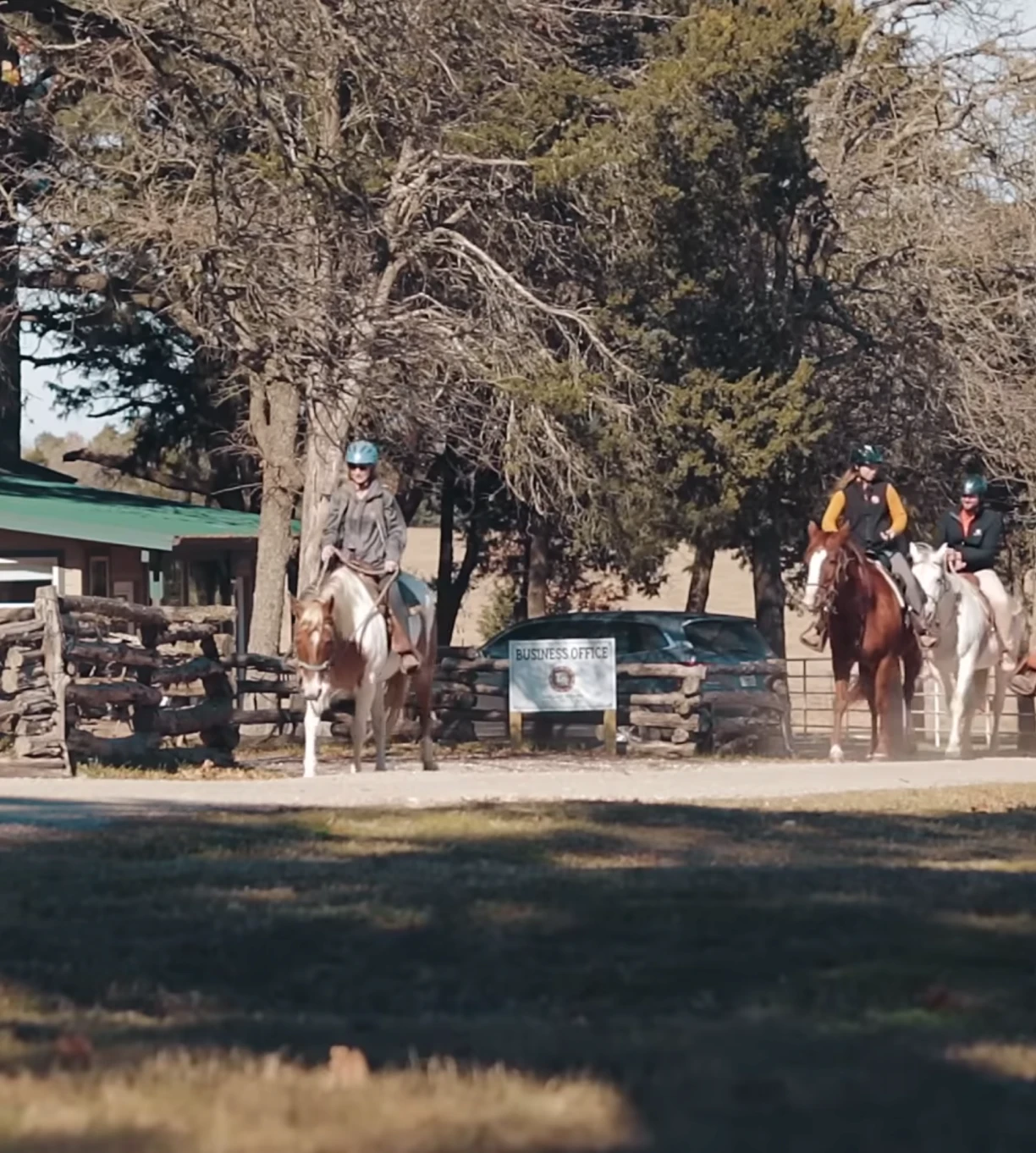
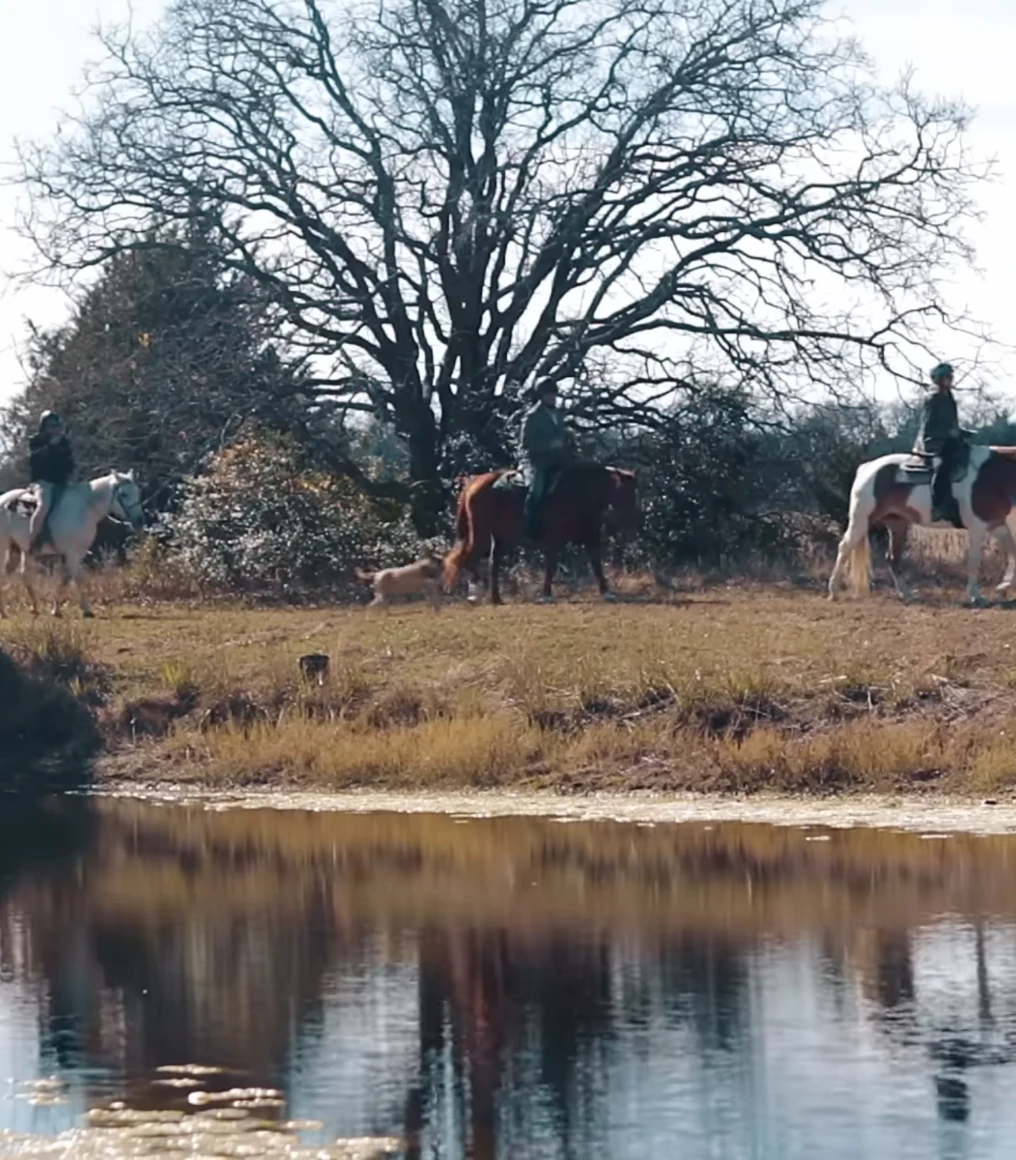
Equine Therapy, also known as Equine-Assisted Therapy, is an experiential treatment approach that incorporates horses into the therapeutic process.[1] This innovative method leverages the unique qualities of horses to help those struggling with substance use disorders develop crucial skills for recovery and personal growth.
In equine therapy for addiction, clients engage in various activities with horses, such as grooming, leading, and sometimes riding, under the guidance of trained therapists and equine specialists. These interactions serve as a mirror for human behavior and emotions, allowing for immediate and honest feedback at the treatment center.[2]
Horses, being highly sensitive and intuitive animals, respond to a person’s emotional state and body language, often reflecting the inner turmoil or calm of the individual working with them.[3] This dynamic creates opportunities for clients to gain insights into their own behaviors, communication patterns, and emotional responses.
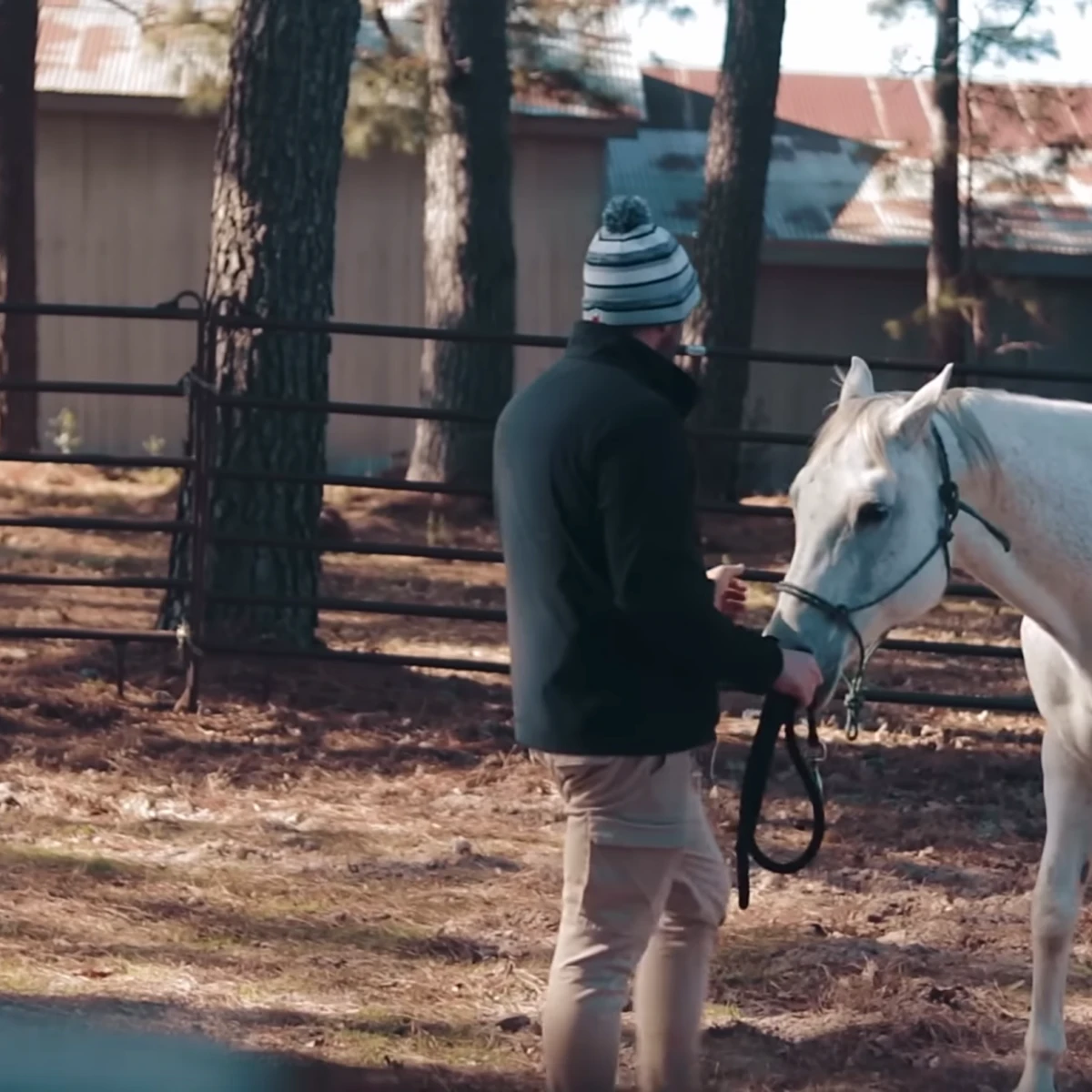
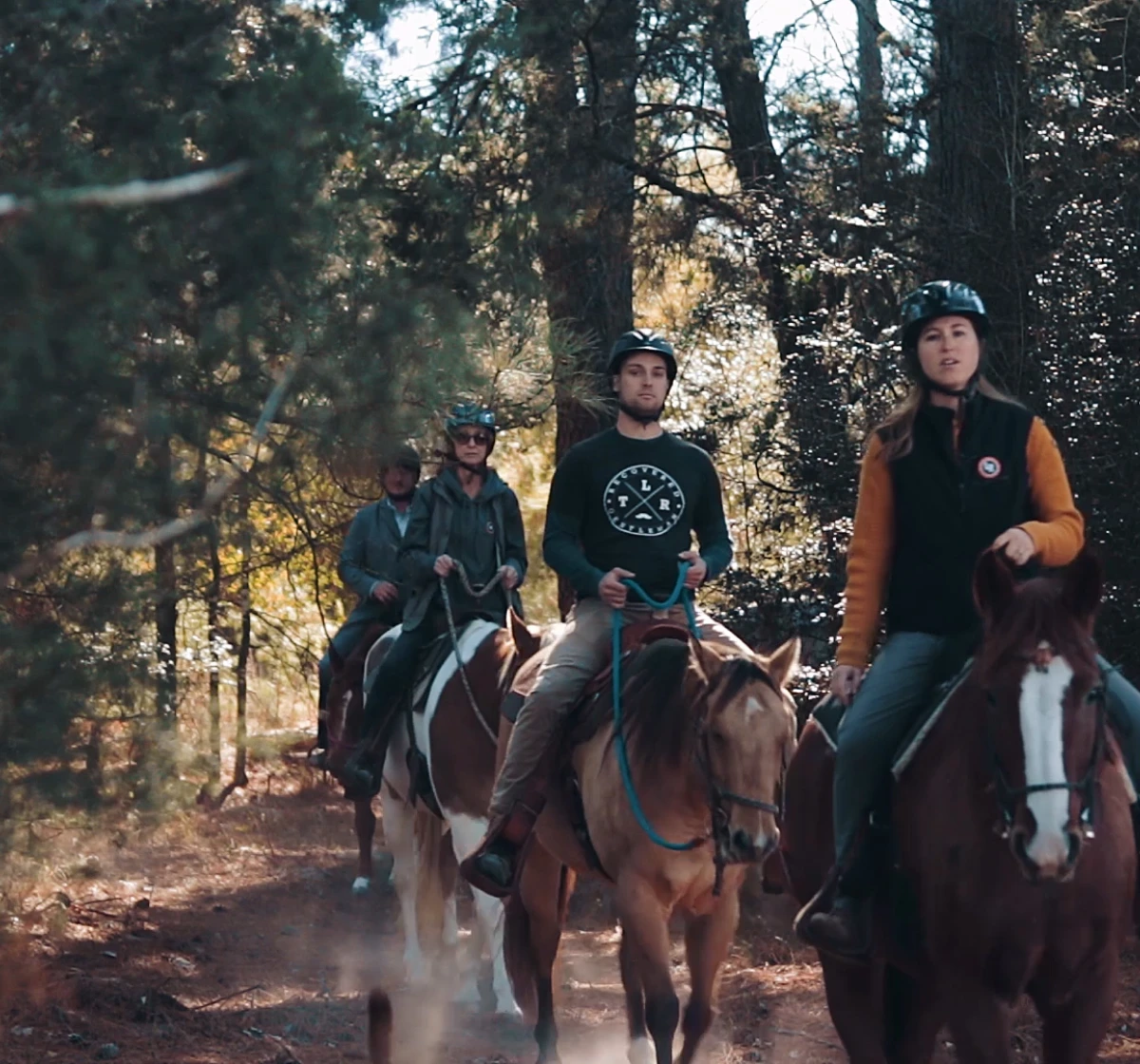
The therapy goes beyond simply working with horses – it’s a structured approach that addresses core issues related to addiction, such as trust, boundaries, self-esteem, and impulse control. Clients learn to build relationships with the horses based on mutual respect and clear communication, skills that directly translate to human relationships and recovery.
Moreover, the physical nature of working with large animals can help individuals reconnect with their bodies, reduce anxiety, and develop a sense of empowerment and accomplishment. These experiences provide valuable metaphors for the challenges and triumphs of the recovery journey, offering a unique and often profound pathway to healing and self-discovery.
The benefits of equine therapy for substance use and dual diagnosis treatment are numerous, working by leveraging the unique characteristics of horses and their interactions with humans to facilitate healing and personal growth:[4]
Horses are highly attuned to non-verbal cues, forcing clients to become more aware of their own body language and emotions. This increased self-awareness is crucial for recognizing and managing triggers in recovery.
Horses respond instantly to a person’s emotional state, providing real-time feedback that can be more impactful than verbal therapy alone. This immediate mirroring helps clients recognize how their internal states affect their interactions.
Developing a relationship with a horse requires patience, consistency, and clear communication, all skills that are directly applicable to rebuilding human relationships damaged by addiction.
Working with large animals can be both exciting and intimidating, providing opportunities to practice emotional regulation and stress management techniques in a controlled environment.
Many aspects of working with horses serve as powerful metaphors for the recovery journey, allowing clients to gain insights into their addiction and recovery process from drug abuse and co-occurring mental health disorders.
Successfully completing tasks with horses builds confidence and a sense of accomplishment, which can boost self-esteem and motivation for recovery.
Interacting with horses requires full attention and presence “in the moment,” helping clients practice mindfulness and break cycles of rumination or anxiety.
Horses don’t judge based on past behaviors or struggles with addiction, providing a safe space for clients to be vulnerable and authentic.
Research consistently demonstrates the significant impact of equine-assisted therapy in addiction treatment, highlighting its ability to foster profound personal growth and enhance overall treatment outcomes:[5, 6, 7]
The stable environment provides a unique context for individuals to reconstruct their identity. Participants often develop a sense of self that is useful, responsible, and accepted – a stark contrast to the “patient self” typically experienced in traditional treatment settings. This shift in self-perception can be transformative, extending far beyond the immediate therapy sessions.
Qualitative data reveals that equine-assisted therapy offers more than just a break from conventional therapy. Participants report developing strong bonds with the horses, which contributes to increased self-efficacy, improved emotional states, and heightened motivation for substance use disorder (SUD) treatment. These factors can significantly boost engagement and commitment to the overall recovery process.
Studies have shown that equine-assisted therapy, when used as a complementary treatment for SUD patients, effectively enhances emotion regulation skills, bolsters self-efficacy, and improves perceived self-esteem [7]. These improvements are crucial for maintaining long-term sobriety and overall well-being.
Studies have shown that equine-assisted therapy, when used as a complementary treatment for SUD patients, effectively enhances emotion regulation skills, bolsters self-efficacy, and improves perceived self-esteem [7]. These improvements are crucial for maintaining long-term sobriety and overall well-being.
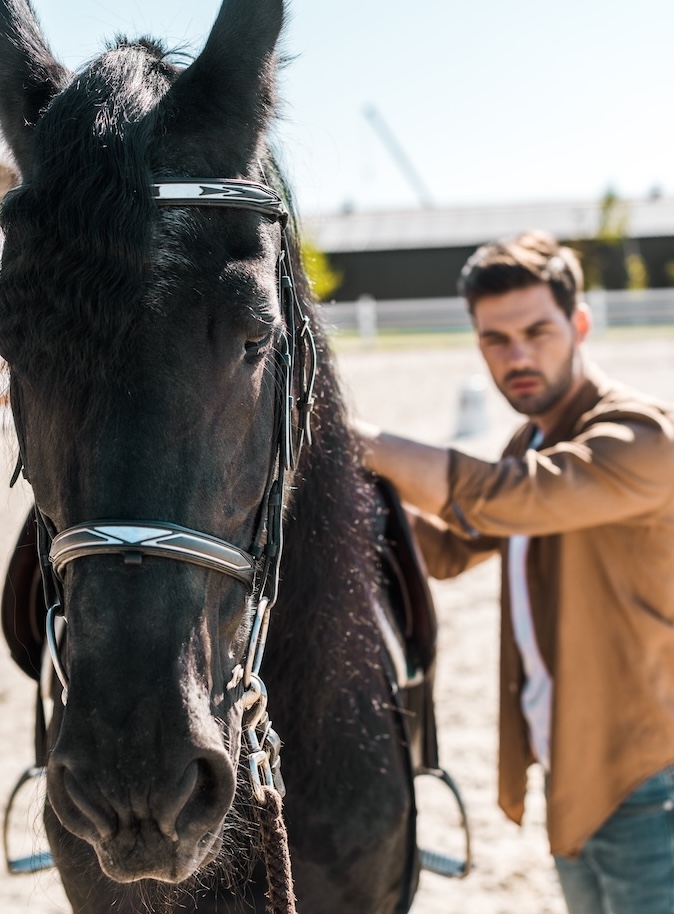
Equine therapy at The Last Resort, located just outside Austin, Texas, offers a unique and transformative experience for men seeking recovery from substance use and co-occurring mental health challenges. Addiction isolates people, cutting them off from their emotions, relationships, and even their sense of self. Horses have an incredible ability to bring people back to the present moment, helping them rebuild trust, emotional awareness, and authentic relationships—starting with themselves.
Throughout the equine therapy program, men at The Last Resort will engage in various activities designed to foster empathy and understanding. Interacting with horses as separate, sentient beings, clients learn to build trust and communicate effectively, developing a strong bond with their equine partners. This connection helps them recognize the impact their actions have on others, promoting self-awareness and fostering empathy.
bodies and emotions. Through working with horses, clients learn to tune into their feelings and better regulate their emotions, which is essential for maintaining sobriety.
Additionally, equine therapy offers a healthy, active way to rediscover joy and have fun in sobriety. This experience not only enhances self-esteem and confidence but also confirms that a fulfilling, sober life is possible and within reach.
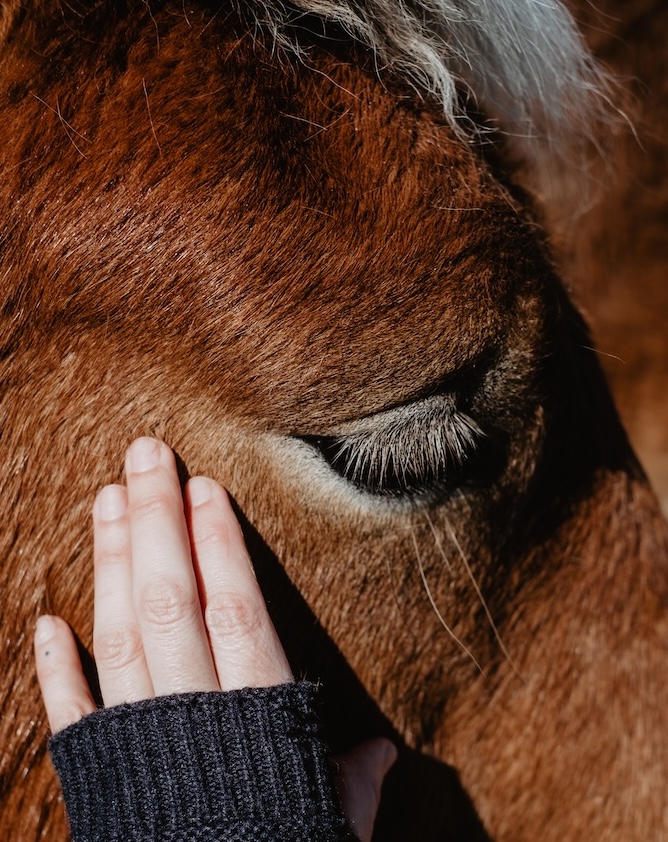
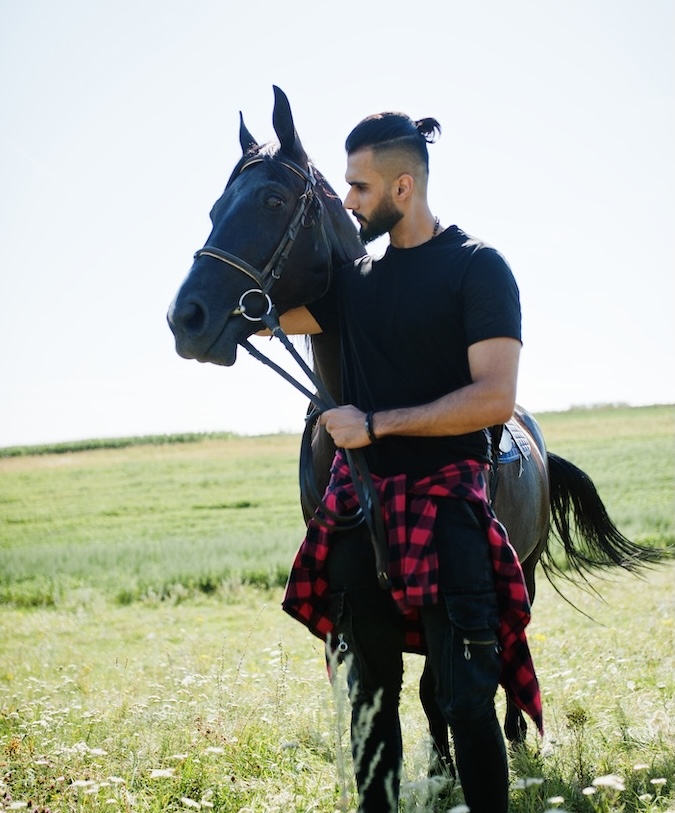
Our equine therapy program is hands-on and practical, designed for men who benefit from active engagement rather than just sitting and talking. While every session is different, clients can expect to:
Many of the skills gained in equine therapy translate directly into everyday recovery—handling frustration without reacting, learning how to rebuild trust, and understanding the importance of consistency, discipline, and emotional awareness.
At The Last Resort Recovery Center, equine therapy is an opportunity to step outside the therapy room and experience real-world personal growth in a way that feels natural, hands-on, and rewarding.
Men in recovery often struggle with trust, communication, and emotional regulation, especially after years of relying on substances to cope. Horses have a way of cutting through the noise. They don’t care about what you say—they respond to how you show up. If you’re tense, avoidant, or frustrated, the horse will pick up on it immediately. If you’re present, patient, and engaged, it will mirror that energy back.
At The Last Resort, equine therapy is designed to give you an experience that helps you break old patterns, build new strengths, and rediscover a sense of purpose beyond addiction.

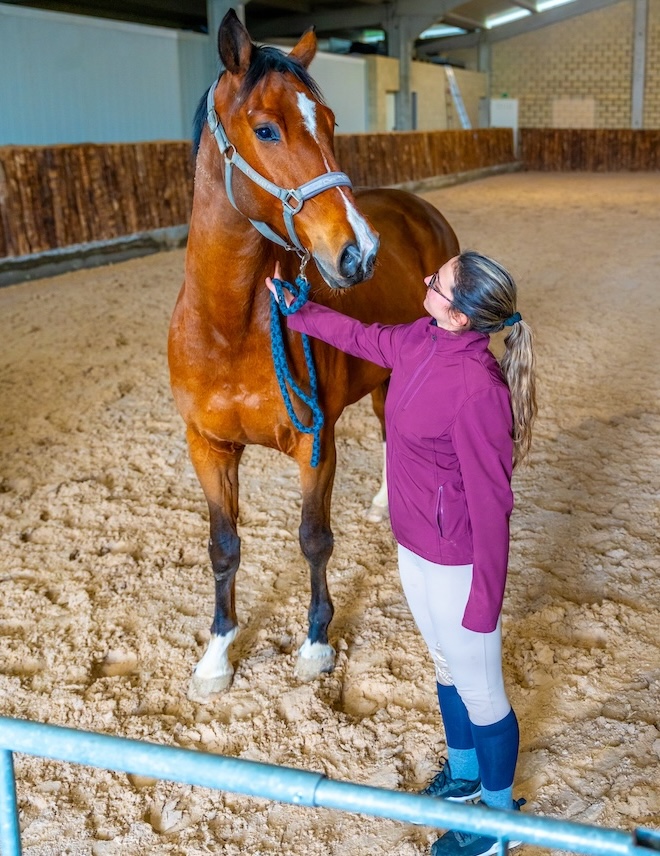
Equine therapy at The Last Resort is a structured, evidence-based therapeutic approach guided by experienced clinicians who specialize in addiction recovery and mental health treatment. Our team of licensed therapists, equine specialists, and addiction counselors work together to create a trauma-informed environment where men can safely explore personal growth and healing.
Clinicians play a critical role in the therapy process, helping clients interpret their interactions with horses and drawing connections between their behaviors in the arena and their experiences in real life. Whether clients struggle with emotional regulation, trust, or self-esteem, our team helps them navigate these challenges through tailored equine therapy sessions.
One of the most challenging aspects of addiction treatment is navigating the transitions between different levels of care. Whether moving from residential treatment to outpatient care or reintegrating into daily life, these shifts can be challenging to manage. Equine therapy at The Last Resort helps men develop the emotional resilience to navigate these changes successfully.
Working with horses fosters patience, adaptability, and trust—qualities directly translating to real-world transitions. By engaging in equine therapy throughout various stages of recovery through the continuum of care at The Last Resort, clients build the confidence needed to handle life’s challenges without relying on substances.
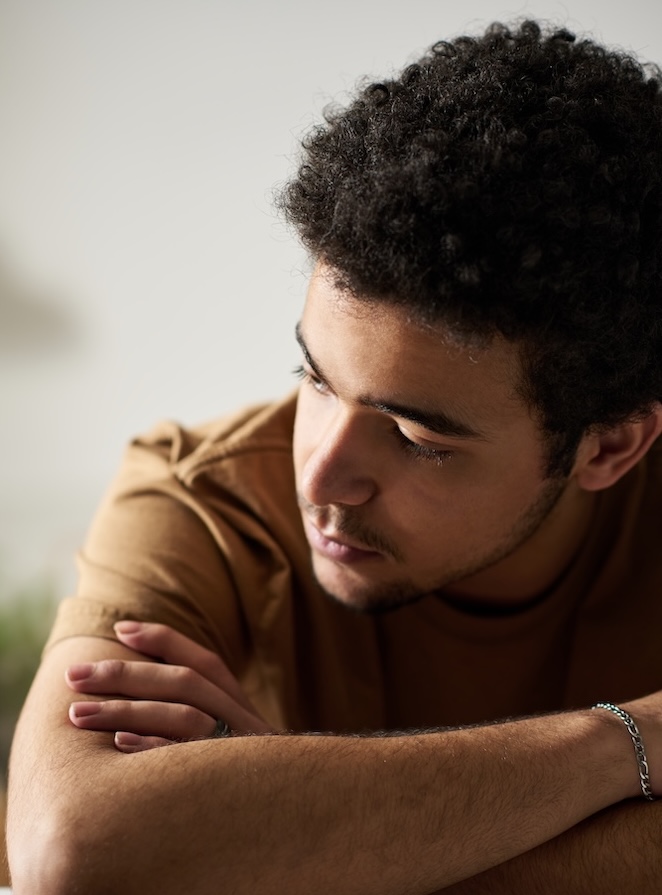
At The Last Resort, we believe in treating the whole person—mind, body, and spirit. Our wellness approach extends beyond traditional therapy sessions, incorporating equine therapy as a powerful tool for physical, emotional, and psychological well-being.
Benefits of equine therapy in promoting wellness include:
Engaging in activities like grooming, leading, and groundwork with horses provides low-impact movement that supports overall health.
Working with horses helps reduce stress and anxiety, fostering a sense of calm and balance.
Many men find a deeper sense of purpose and inner peace through their interactions with these powerful yet gentle animals.
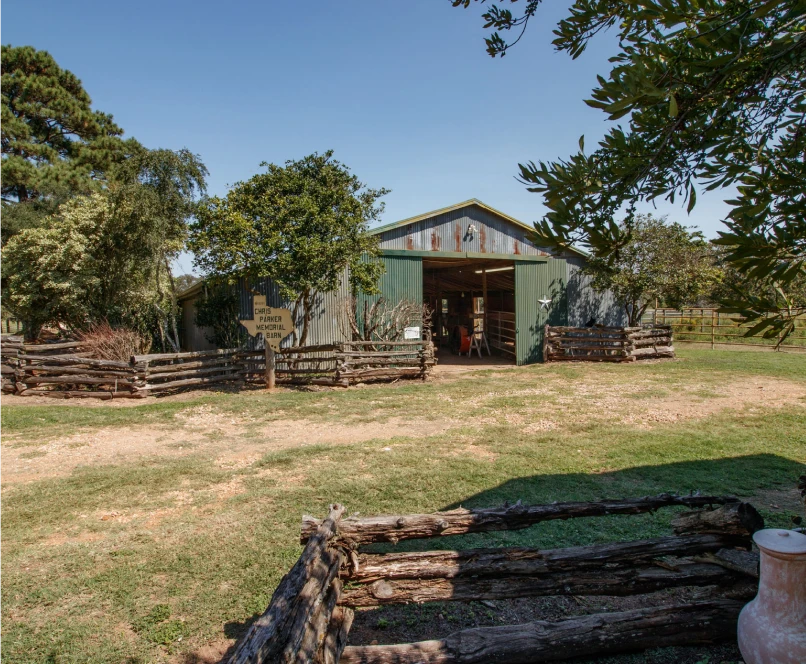
Located just outside the Austin area, The Last Resort Recovery Center is one of the few addiction treatment facilities in Central Texas that offers comprehensive equine-assisted therapy. Our 55-acre ranch provides a peaceful, nature-rich setting where men can fully engage in the healing process.
Our program is designed for those seeking addiction treatment in Austin and the surrounding areas, including San Marcos, Round Rock, Georgetown, and the greater Central Texas region. Whether you are an Austin-area resident or traveling for treatment, our residential and outpatient equine therapy rehab offers a unique opportunity to heal in a restorative and supportive environment.
While traditional therapeutic riding is often associated with physical disabilities, it also offers significant benefits for individuals recovering from substance use disorders. At The Last Resort, we recognize the profound impact that horseback riding and equestrian activities can have on mental health and addiction recovery.
In addition to groundwork and structured therapy exercises, horseback riding may be incorporated into specific equine therapy sessions. Riding a horse fosters:
Clients learn to guide, care for, and build trust with the animal, reinforcing key skills essential to recovery.
Riding improves balance, coordination, and self-regulation, helping clients reconnect with their physical and emotional well-being.
Overcoming challenges on horseback can be significant for those working to regain control of their lives in sobriety.
Beyond its physical benefits, equine therapy is a powerful tool for addressing mental health concerns such as stress, anxiety, depression, and PTSD. Equestrian-assisted therapy’s structured yet dynamic nature provides a healthy, engaging outlet for emotional processing and self-discovery.
At The Last Resort, we integrate equestrian-assisted therapy throughout our continuum of care, offering clients a hands-on, experiential way to develop new coping strategies. Whether through grooming, groundwork, or riding, these activities help men rebuild confidence, strengthen emotional resilience, and find renewed purpose in their recovery journey.
Equine-assisted therapy at The Last Resort offers a powerful and transformative experience for those in recovery from drug addiction at our recovery center. By fostering empathy, self-awareness, and emotional regulation through working with horses, clients can heal past traumas and learn to build healthier relationships. The skills and insights gained from this unique therapeutic approach contribute significantly to long-term sobriety and overall well-being.
Horses contribute to the therapeutic process in equine therapy by providing a unique and non-judgmental environment that encourages emotional growth and self-discovery. Equine therapy addiction recovery methods help develop trust, empathy, and communication skills. Horses are sensitive to non-verbal cues and mirror human emotions, which allows participants to explore their feelings, behaviors, and relationships in a supportive and insightful way.
Equine therapy for addiction focuses on teaching various life skills and lessons, including:
These skills are integral to recovery and can be applied to daily life, helping individuals maintain sobriety and navigate challenges effectively.
While specific requirements may vary by program, participants generally do not need prior horse experience or a certain level of physical fitness to engage in equine therapy for addiction. However, individuals with severe allergies to horses or significant physical impairments may need accommodations or alternative activities. Mental health stability and readiness for therapeutic exploration are typically assessed to ensure safety and maximize the benefits of the therapy.
Yes, equine therapy for alcoholics has shown effectiveness in addressing mental health issues commonly co-occurring with addiction, such as anxiety, depression, post-traumatic stress disorder (PTSD), and more. Interacting with horses can promote emotional healing, reduce symptoms of anxiety and depression, and improve overall well-being.
The therapeutic environment provided by equine therapy encourages self-reflection, builds confidence, and enhances resilience in your treatment plan, which are crucial for managing both addiction and mental health challenges at an addiction treatment center and beyond.
Equine therapy and addiction recovery are a powerful pairing with lifelong benefits, but there are some precautions. When starting an animal-assisted therapy as part of an addiction treatment program, you should consider the following:
[1] Arnon, S., Fisher, P. W., Pickover, A., Lowell, A., Turner, J. B., Hilburn, A., Jacob-McVey, J., Malajian, B. E., Farber, D. G., Hamilton, J. F., Hamilton, A., Markowitz, J. C., & Neria, Y. (2020, June 8). Equine-assisted therapy for veterans with PTSD: Manual Development and preliminary findings. Military medicine. https://www.ncbi.nlm.nih.gov/pmc/articles/PMC7282489/ on July 3, 2024
[2] Naste, T. M., Price, M., Karol, J., Martin, L., Murphy, K., Miguel, J., & Spinazzola, J. (2018). Equine facilitated therapy for complex trauma (EFT-CT). Journal of child & adolescent trauma. https://www.ncbi.nlm.nih.gov/pmc/articles/PMC6132374/ on July 3, 2024
[3] Baba, C., Kawai, M., & Takimoto-Inose, A. (2019, August 29). Are horses (equus caballus) sensitive to human emotional cues? Animals : an open access journal from MDPI. https://www.ncbi.nlm.nih.gov/pmc/articles/PMC6770165/ on July 3, 2024
[4] Diaz, L., Gormley, M. A., Coleman, A., Sepanski, A., Corley, H., Perez, A., & Litwin, A. H. (2022, December 14). Equine-assisted services for individuals with Substance Use Disorders: A scoping review – substance abuse treatment, prevention, and policy. BioMed Central. https://substanceabusepolicy.biomedcentral.com/articles/10.1186/s13011-022-00506-x on July 3, 2024
[5] Kern-Godal, A., Brenna, I. H., Arnevik, E. A., & Ravndal, E. (2016, October 6). More than just a break from treatment: How substance use disorder patients experience the stable environment in horse-assisted therapy. Substance abuse : research and treatment. https://www.ncbi.nlm.nih.gov/pmc/articles/PMC5054942/ on July 3, 2024
[6] Diaz, L., Gormley, M. A., Coleman, A., Sepanski, A., Corley, H., Perez, A., & Litwin, A. H. (2022b, December 14). Equine-assisted services for individuals with Substance Use Disorders: A scoping review. Substance abuse treatment, prevention, and policy. https://www.ncbi.nlm.nih.gov/pmc/articles/PMC9749232/ on July 3, 2024
[7] Souilm, N. (2023, October 13). Equine-assisted therapy effectiveness in improving emotion regulation, self-efficacy, and perceived self-esteem of patients suffering from substance use disorders – BMC complementary medicine and therapies. BioMed Central. https://bmccomplementmedtherapies.biomedcentral.com/articles/10.1186/s12906-023-04191-6 on July 3, 2024